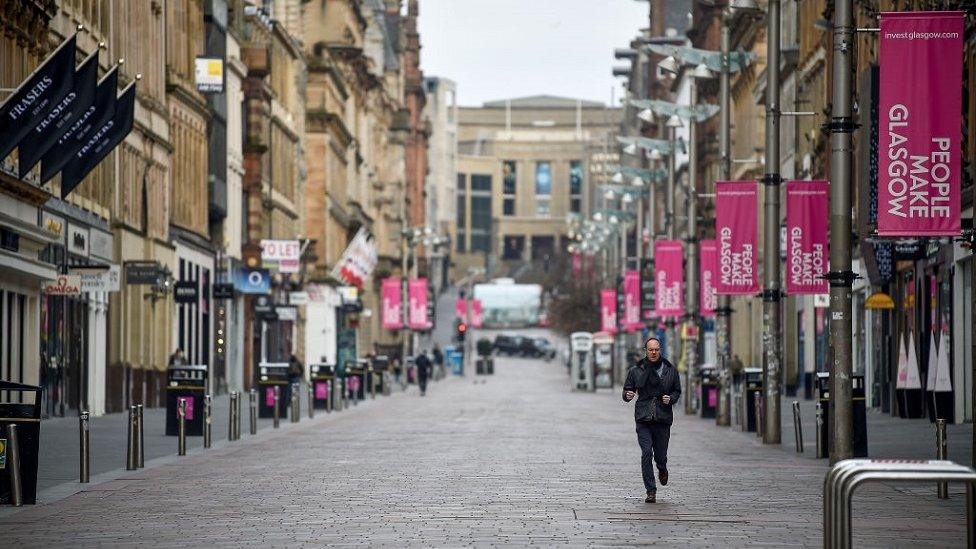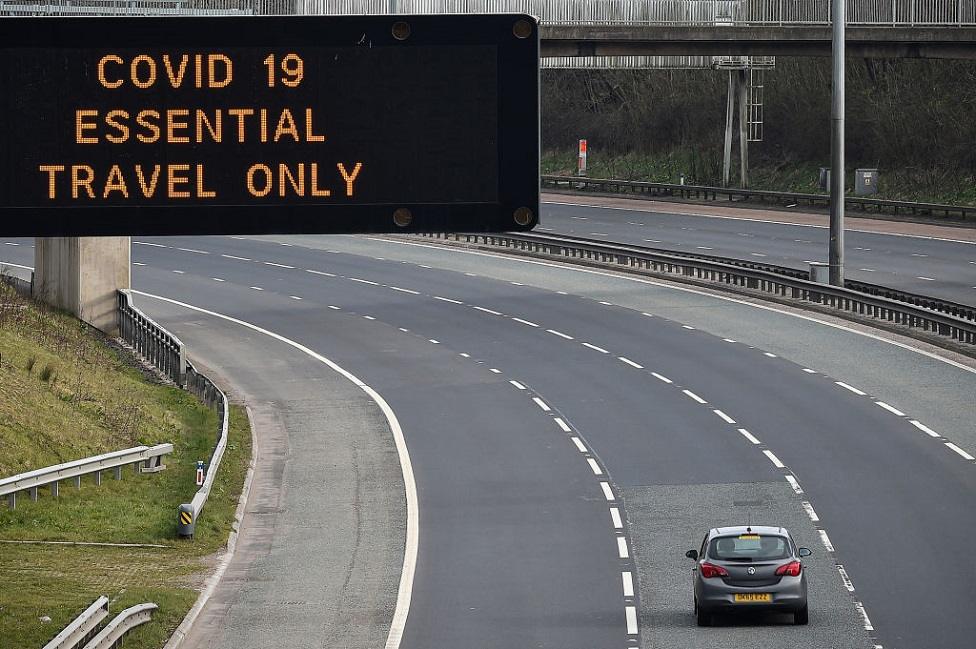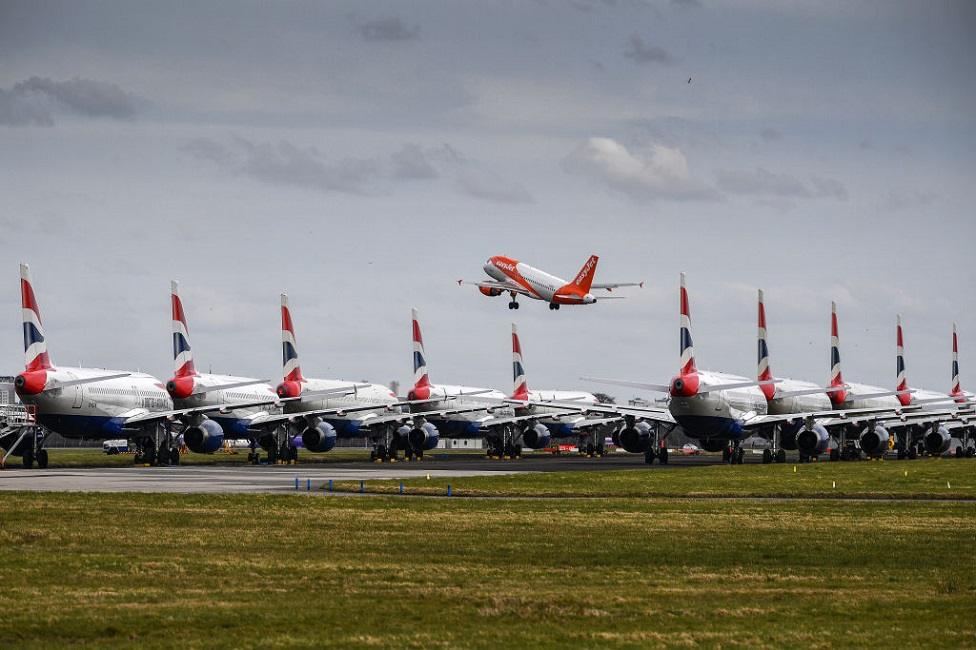Coronavirus: Recession? This is deeper and more challenging
- Published

The streets of Scotland's biggest city are all but deserted
Recession? We're already in something much deeper and more challenging.
It is re-shaping relationships between businesses, with customers, and between the state and individuals as well as with firms. When it's over, the economy, government and work may look very different.
The Scottish economy has special vulnerabilities, reflected in analysis from the Fraser of Allander Institute - and so do lower-income households without a rainy day fund.
There's a quaint notion that the economy might be heading for recession. Let's get real: we're in one.
Unless it's unusually long, we don't get confirmation of a recession until after it's over. Such is the nature of data gathering. With luck, this one won't last long. But it is deep.
Anyway, it doesn't really matter if it's technically a recession or not. What we're currently experiencing deserves a new word to describe it - something that reflects the suddenness and sharpness of the shock. It's more like a coronary or stroke than merely a cyclical, temporary reversal of economic output.
It comes with parallel crises of a health fear and huge social dislocation, and it does so with a global spread. There have been pandemics before, but not in an era of a highly integrated economy, financially leveraged and geared to continue at or close to full tilt. The economy is not designed to cope with lockdown.
Nor has there been such a rampant infection in an era when medical science can track its course, and mobilise the resources and know-how to stamp it out. That knowledge gives the justification for lockdown. The economy and society are being forced to bend and buckle under the weight of medical statistics, so as to change the shape of a graphicised bell curve. It's a funny old world.
What, then, does it mean for the economy? I've written in recent blogs about the impact on market confidence; of the need for rationing of scarce resources where money doesn't talk; of the re-shaping of relationships between supplier and customer, where businesses are forced into choosing priorities.
At times like these, in transacting business, the question of trust becomes all the more important.
But for now, financial survival may seem more important. Who needs a brand reputation if you don't have a business any more?

People have been urged to make only essential journeys
And to that end, it's the government that's asking for our trust as never before. It is asking us to trust its science and scientists, and to trust that the NHS will be there for us.
It is "throwing its arms around workers", in the prime minister's words. (Not a comforting image, in my opinion.) Or it's putting a safety net under companies. No longer is welfare for individuals and families facing hard times. It's for anyone affected, and that's everyone.
The drive to get the deficit down over the past decade, so that debt could be reduced, while the reach of the state was rolled back, has been thrown hard into reverse. And by the Conservative Party.
The money is being splurged by Rishi Sunak like the Tory caricature of Jeremy Corbyn. Pay now: worry about the bills later.
There's a new social contract in which we - individuals, parents and employers - play our part, by accepting an unprecedented disruption to our social and work lives and to our liberty.
Companies are being asked to step away from their focus on markets and profit, and to put down deeper roots in communities and society.
With waning trust in business over recent years, some are grasping that as an opportunity. (Some, however, seize the opportunity for cheesy PR stunts, with giveaways galore to NHS workers.)
And what, to come closer to home, about the Scottish economy? Some answers to that came, on Wednesday, from the economists at the Fraser of Allander Institute.

Many British Airways planes are grounded at Glasgow Airport
They highlight the disproportionate vulnerabilities of "social spending" on tourism, cafes, restaurants and retail. After airlines, they were next to take the brunt of this, and they're particularly important to the Scottish economy, representing 13% of output and 19% of employment.
The institute also points to the fragility of household finances. In China, they save and save - up to half of earnings. Here, many have no savings at all, or negative savings, better known as debt.
The Strathclyde University finance experts cite figures showing 42% of Scottish households in the lowest-income 10th of the population cannot last a month without earnings. Around three quarters of households in that "bottom decile" would not have a sufficient buffer if there were no income for six months.
And this publication of the regular Allander economic commentary takes a peer over the horizon, to ask what the long-term effects will be.
Will this put us off the track of tackling climate change, for instance?
With the familiarity we're fast gaining, will work from home become more of a norm, and video-conferencing replace much business travel?
Will this be the point at which declining industries start to decline faster? Many shops that are now shut may not be open again, because of the structural change already under way.
Oil and gas, with its prices deeply depressed, is shedding investment at a rapid rate worldwide. Some North Sea fields will become stranded as platforms are decommissioned, never to return to viability.
If businesses collapse now, how much "scarring damage" will be done as others are set up, ask the Allander economists, and as people find new jobs?
How much potential will be lost by the disruption to learning in schools and universities? Bear in mind that the most influential modelling of this pandemic points to another surge and potential lockdown in autumn, interrupting another school year.
Says Graeme Roy, director of the Fraser of Allander: "The large scale mothballing of our economy in response to the public health emergency is unlike anything we have seen since World War Two."
He suggests the hope of a limited hit to productive capacity is looking overly optimistic.
"The scale of the shutdown in our economy is so large it will take months, if not years, to recover. Key now will be ensuring that long-term scarring effects of any recession can be mitigated as much as possible.
"The economy that emerges from this, from the shops on our high street through to day-to-day working practices, is likely to look quite different."
My hunch is that Professor Roy's forecast will come to look like an under-statement.

A SIMPLE GUIDE: What are the symptoms?
AVOIDING CONTACT: Should I self-isolate?
LOOK-UP TOOL: Check cases in your area
WILL I GET PAID IF I SELF-ISOLATE? The rules on sick pay

